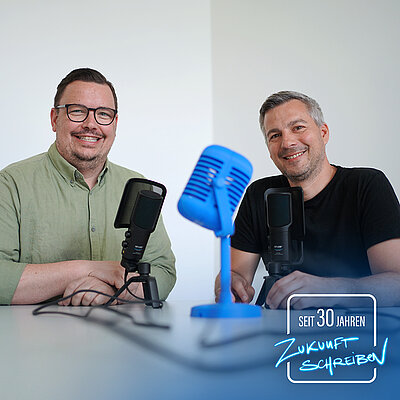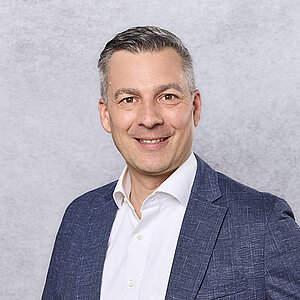30 years of health - innovations that change lives
From the capsule to AI: 30 years of health in transition
01.10.2025
From 3D-printed prostheses to surgical robots and digital monitoring systems: Hardly any other industry has experienced as many upheavals in the past three decades as the healthcare sector. Advances in research and technology have fundamentally changed our view of care, prevention and nursing - and at the same time raised new questions: How do we deal with the flood of studies? How can we mitigate the shortage of specialists? And what role will health data play for each individual patient in the future?
Sebastian Hilke, Head of the Health Innovation Network at Bayern Innovativ, talks about these questions, the biggest innovations of the past 30 years and the future of the healthcare system in the following interview.

What motivated you to work in the healthcare sector?
Sebastian Hilke: Originally, my plan was to study industrial engineering because I found it an exciting combination of technology and business. But technology wasn't really my thing.
Then I found out that there was healthcare management. I found that exciting because the social aspect, i.e. doing something with people, was very well represented.
And so, as part of my studies, I found out in a seminar on e-health that health is connected to technology after all. I found this very exciting, which is why I then dealt with the topic of telemedicine and the status quo of telemedicine in Germany in my thesis.
After graduating, I was lucky enough to be able to continue working in the field of telemedicine and experience first-hand the added value that such technologies can have for individual patients. That's also what excites me about the work: doing something where you can clearly see and feel the benefits for the care we all receive.
What have been the most influential innovations in healthcare over the last 30 years?
Sebastian Hilke: Basically, a lot has happened in many areas. There are new materials that can be used to build prostheses. There are biomaterials that resemble the body. We can use 3D printing to adapt these new materials to individual patients. There are robots that assist in surgery and make operations safer.
Increasing miniaturization also plays a major role: there are now capsules that can be swallowed and take photos of the entire gastrointestinal tract. We have also made great progress in genomics. We can evaluate DNA analyses and draw conclusions about a person's future health, which in turn allows us to create personalized therapeutic offerings.
Digitalization has also had a huge impact on many areas of health. So a lot has really happened in recent years.
In your opinion, which innovation has had the biggest impact on the healthcare industry?
Sebastian Hilke: Digitalization. Not just because it's one of my hobbies. Very early on, in the 1990s, it became clear how digitalization and computers can support the research and development of active ingredients and medical products.
Later came the topic of digital healthcare solutions, i.e. telemedicine, but also digital healthcare applications and electronic patient records. These are all things that have become increasingly important in recent years and have gained momentum over the last five to seven years, bringing great added value to healthcare.
However, digitalization doesn't just have advantages. I see the disadvantages in the fact that research is becoming increasingly difficult to keep track of. In the past, there were perhaps 400 new studies per year, so as a practitioner you could easily keep up to date with a few studies per day.
Today, studies are published in the six-figure range, which makes it difficult to stay informed in all facets. Here again, digitalization can help us make the right decisions and select the right therapies.
How have the many innovations and the rapid growth of the healthcare sector changed your work in the Bayern Innovativ team?
Sebastian Hilke: Basically, our focus, including in our MedTech Pharma forum, was on medical technology and medical devices. Our topics were the approval of medical devices and the question of how innovation from science can be brought to the market.
Today, we are more broadly positioned and must also be much more broadly positioned. We are also looking at how digital healthcare solutions are developed and approved and how market entry can be achieved.
These are similar processes, but with different details. We now have a strong team in this area. We also deal with the topic of care, and not just digital solutions, but also how care can be supported. In my opinion, this is an area that has been severely neglected in recent years in terms of supporting innovation. We want to help drive innovation there.
Is there a specific project that has had a particular impact on you?
Sebastian Hilke: To be honest, no. Not because the projects weren't successful, but because we've implemented so many exciting topics and projects in recent years that it's difficult for me to single out just one project. Our flagship event is the Medtech SUMMIT. However, we also organize hackathons, where we focus heavily on ideation in order to generate ideas for solutions together with partners.
We also have many other projects, such as the European Digital Innovation Hub DigiCare, which focuses on digitalization for products directly in the industry, but also on development processes.
We have an exciting INKJET project in which we are looking at how active ingredients can be applied by inkjet printing so that they act directly on the skin, which is a completely different topic.
The telematics infrastructure model region, in which we have been looking at the electronic patient file in recent months, is also being supported again by Healthcare BY Your Side, funded by the Bavarian State Ministry of Health, Care and Prevention, where we are also talking to many service providers and trying to raise awareness among the population.
It's a broad field, from medical products and technology to educational work and the question of how the population as a stakeholder can cope with the new solutions.
In your opinion, what are the success factors for successful collaboration between science, business and start-ups?
Sebastian Hilke: In principle, innovation and progress in the healthcare sector can only work through this interaction between science, business and start-ups and thus improve the quality of healthcare.
The companies often have the financial resources and market experience because they have been on the market for a long time.
The scientific innovations provide the in-depth know-how, the basic research and also the capacity to implement research in this breadth and depth.
The start-ups are the agile part, they can also implement something quickly and try out innovations.
These different interactions are what make the work so exciting, because you can see how innovations are created. Our job as an innovation network is to know these different players, bring them together, drive them forward and see where we can perhaps combine something that doesn't yet fit together so obviously.
At the end of the day, we always have the big goal of creating added value for citizens.
Where do you see the biggest challenges for the healthcare sector in the coming years?
Sebastian Hilke: I see two major challenges. One is the issue of rising costs. We have a very good healthcare system in Germany, but it is also very expensive. There are avoidable duplicate examinations, we have lengthy diagnostic processes that sometimes take years to find out what is going on. Sometimes we also have a critical study situation, for example there is the problem of the gender health gap studies, a lot of research is geared towards men, which means that women are sometimes not properly represented in diagnostics and therapy, which means that things are recognized far too late. We need to take a much more individual approach and research and investigate these issues in a more personalized way.
We also need to work much more preventively. At the moment, we tend to practice repair medicine, we react too much and act too little. I think we can do a lot with more prevention, and digitalization is also an exciting tool. With digital monitoring systems or devices, you can detect a lot of things earlier and, in the best case, even avoid serious illnesses.
The second point is the lack of staff. Due to demographic change, there are too few staff in nursing and medical care, and this will only get worse over time. Technology can play a key role here; it cannot solve the problem, but it can provide appropriate support and take over routine or documentation activities in order to provide more capacity for actual nursing and medical care.
Which technologies and innovations do you see as game changers for the industry?
Sebastian Hilke: Everything that revolves around the topic of health data. In four years' time, we will have the European Health Data Space, which I believe we should have had much earlier.
This is an important point: having health data available across the board, not only for research, but also for day-to-day diagnostics and treatment. This is the primary benefit of not only looking at the data within the research framework, but also the data that is generated on a daily basis, be it in the doctor's surgery, in the nursing home, in the pharmacy or in the hospital.
Wherever data is collected, it should also be collected and analyzed. Artificial intelligence can also play an important role here, because it is difficult for us to create a meaningful picture from this mass of data and perhaps also to recognize correlations in a society, and this is where AI can provide support.
So this topic of health data can help us take a big step towards more active and timely medicine that is also closer to the point of care.
What about the anonymization of health data?
Sebastian Hilke: It doesn't always have to be anonymized data. If the data is anonymized, we can't draw any conclusions about individual people. This means that if we examine data in a large context, for example from a collective of men aged between 40 and 50, and then find that there are individuals with certain conditions, we cannot give them any feedback.
That's why we need pseudonymization so that we can help people with the results. Anonymization is not always the best way. It is more important to handle the data in a self-determined and confident manner and to leave the decision open as to whether or not you want to make your data available for research. If you don't, you won't have these advantages either, or only in a roundabout way. This should be an individual decision.
If you could travel 30 years into the future, what would you ask the healthcare system of tomorrow?
Sebastian Hilke: The thing that would interest me most is how technology will develop and what devices we will have, what diagnostics and therapies will look like, how we will treat people. I find that very exciting. Also to see what breakthroughs there will have been and what innovations will have supported them.
The interview was conducted by Christoph Raithel, Management Consultant, Bayern Innovativ GmbH, Nuremberg.
Promotion of the skilled trades: On the roofs of the world - ROOFFOX bitumen membrane cutting machine (06.08.2025)
Did you know that small companies and craft businesses in Bavaria can receive three innovation vouchers as financial support within two years?
Find out more in this episode from Anja Härtel, expert for innovation vouchers, and Tobias Büttgen, Managing Director of ROOFFOX GmbH.
Your contact


